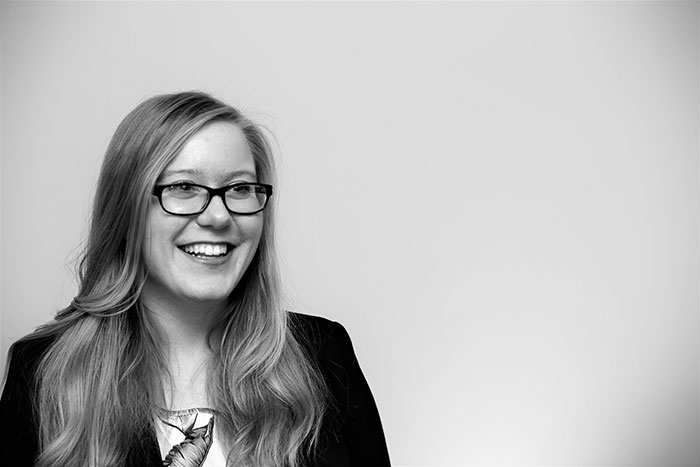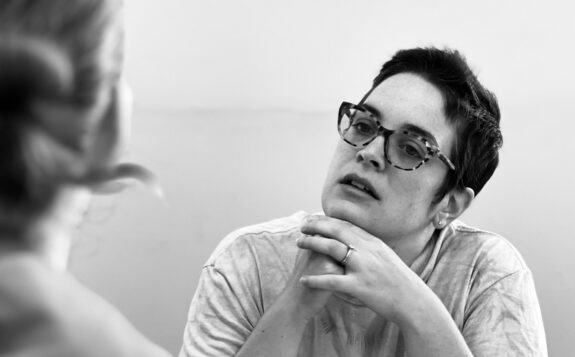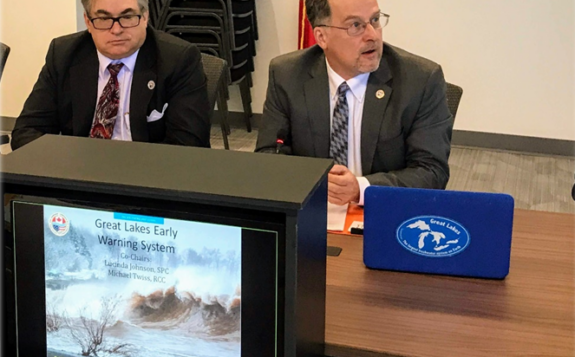Stacey Devlin doesn’t consider herself in a typical history role. The Honours Bachelor of Arts in History and English graduate works at Know History in the field of Public History, working with new technologies, tracing genealogies, creating documentaries, and more, in an effort to share an accurate portrayal of the past.
From Sault Ste. Marie, Ontario, Devlin graduated from Algoma University in 2013. It was while at Algoma that she was first exposed to public history, a facet of history in which historians often work outside of the typical realm of academia. Upon graduation from Algoma, Devlin pursued her new found interest at Western University, earning her Master of Arts in Public History. She was awarded the prestigious Social Sciences and Humanities Research Council of Canada (SSHRC) scholarship to fund her studies.
Devlin credits her undergraduate and graduate degrees, coupled with a one year internship at NORDIK Institute for helping her land a career with Know History, an Ottawa-based historical consulting company, which opened its doors in 2011. “We help people and organizations with a variety of ‘historical services’, including research, exhibits, reports, genealogy, documentaries and films, social network analysis, mapping, oral histories, and traditional knowledge and land use studies.”
A Senior Associate, Devlin has many duties at Know History. “My day to day responsibilities usually include a lot of research and writing – the bread and butter of history,” she says. “Due to my background in digital history, I get to use a lot of different technologies in my job as well. I make GIS maps, do social network analysis, manage databases, and I’ve even written some of my own small computer programs. As a Senior Associate, I also manage projects.”
Devlin’s most exciting project to date has been a longer assignment with the Métis Nation of Ontario. “Recently, I helped research some of the key historic Métis families across Ontario. We collected thousands of documents and helped prepare nearly 100 ‘Root Ancestor’ reports that include these documents, research findings, genealogy and relationship charts, and full bibliographies for each family.” According to Devlin, this project has been a large and meaningful resource for Métis in Ontario, as well as those interested in the history of Métis in the province. “Not every Métis family in Ontario has been covered in these reports, but they will continue to expand in the future. This will make it easier for people to access their family history and will ease the burden of independent genealogy research for those who want to establish their Métis citizenship. It’s very rewarding to work on a project which makes these important stories more accessible, especially since Métis history in Ontario isn’t as well documented as it is in other provinces.”
While Devlin herself once planned to follow the traditional trajectory of those interested in history, she is glad she was exposed to the realm of public history and is hopeful others too will consider a future in the growing field. “Public history isn’t always addressed in undergraduate history degrees. I happened across it in my third year, but I didn’t realize historical research companies existed until I was doing my Master’s degree. I’m happy to see this is changing. And I’m very excited to see the History Department at Algoma U offering their second public history course this year. Hopefully it will encourage history students to have a broader understanding of what their degree can do.
“I think it’s important for history students to know that this sort of thing is a career option. I very much respect my colleagues in academia, but there’s a whole other world of history going on outside of universities. Much of the research being done off campus has a direct impact on not only how people approach the past, but also on current policy development, decision making, and quality of life. It’s important for people with a strong history background to be in such positions.”
Devlin will be returning to Algoma U on November 20th, giving a talk in the public history course on freelancing and historical consulting as a career. Devlin is excited to return back to campus and share her enthusiasm for public history with others. “Algoma U was … where I discovered my interests in history and in digital humanities. I feel like Algoma U gave me many opportunities to develop those interests toward a career. For example, I had several research assistantships with Dr. Michael DiSanto’s George Whalley Project, and in my fourth year, I presented a paper in Toronto with two of my former professors, Dr. Warren Johnston and Dr. Alice Ridout…So it all comes full circle.”
Share Article




